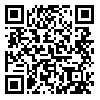Volume 20, Issue 11 (2-2018)
J Arak Uni Med Sci 2018, 20(11): 34-46 |
Back to browse issues page
Download citation:
BibTeX | RIS | EndNote | Medlars | ProCite | Reference Manager | RefWorks
Send citation to:



BibTeX | RIS | EndNote | Medlars | ProCite | Reference Manager | RefWorks
Send citation to:
Riyahi A, Rassafiani M, Yazdani S, Moradzadeh R. Psychometric Properties of the Persian Version of the Eating and Drinking Ability Classification System in Children with Cerebral Palsy in Iran. J Arak Uni Med Sci 2018; 20 (11) :34-46
URL: http://jams.arakmu.ac.ir/article-1-5427-en.html
URL: http://jams.arakmu.ac.ir/article-1-5427-en.html
1- MSc of Occupational Therapy , Department of Occupational Therapy, School of Rehabilitation, Arak University of Medical Sciences, Arak, Iran. , Azade.riyahi@yahoo.com
2- PhD of Occupational Therapy, Pediatric Neurorehabilitation Research Center, University of Social Welfare and Rehabilitation Sciences, Tehran, Iran.
3- Occupational Therapist in Social Welfare Organization, Mazandaran, Iran.
4- PhD of Epidemiology, Department of Epidemiology, School of Health, Arak University of Medical Sciences, Arak, Iran.
2- PhD of Occupational Therapy, Pediatric Neurorehabilitation Research Center, University of Social Welfare and Rehabilitation Sciences, Tehran, Iran.
3- Occupational Therapist in Social Welfare Organization, Mazandaran, Iran.
4- PhD of Epidemiology, Department of Epidemiology, School of Health, Arak University of Medical Sciences, Arak, Iran.
Abstract: (2713 Views)
Abstract
Background: Human need for food is one of the inherent or physiological needs that, along with the ability to eat and drink, is the most important factor of health, survival and longevity. Children with cerebral palsy suffer from severe maladjustment in the nutritional mechanism and the creation of unsafe, even risky, conditions for life, due to deficiencies in the disease. Because of the importance of Eating and Drinking Ability Classification System (EDACS) in the research and treatment of children with cerebral palsy, the purpose of this study was to determine the psychometric properties of the Persian version of this system.
Materials and Methods: After the forward and backward translation procedures and investigation of face and content validity, test–retest reliability was assessed between parents and therapists using the intra-class correlation coefficient (ICC). 130 Children (3 to 20 years, mean age 52.35 months and standard deviation 33.96; 73 boys, 57 girls) with various types of CP were classified according to EDACS by both parents and therapists.
Results: The test–retest reliability was high and significant; the ICC related to parents and occupational therapists was 0.98, and the ICC related to speech therapists (0.99) was higher than 0.90 that both of them showed high correlation.
Conclusion: The Persian version of the EDACS is found to be valid and reliable, and is suggested to be appropriate for the assessment of eating and drinking ability in children with cerebral palsy.
Background: Human need for food is one of the inherent or physiological needs that, along with the ability to eat and drink, is the most important factor of health, survival and longevity. Children with cerebral palsy suffer from severe maladjustment in the nutritional mechanism and the creation of unsafe, even risky, conditions for life, due to deficiencies in the disease. Because of the importance of Eating and Drinking Ability Classification System (EDACS) in the research and treatment of children with cerebral palsy, the purpose of this study was to determine the psychometric properties of the Persian version of this system.
Materials and Methods: After the forward and backward translation procedures and investigation of face and content validity, test–retest reliability was assessed between parents and therapists using the intra-class correlation coefficient (ICC). 130 Children (3 to 20 years, mean age 52.35 months and standard deviation 33.96; 73 boys, 57 girls) with various types of CP were classified according to EDACS by both parents and therapists.
Results: The test–retest reliability was high and significant; the ICC related to parents and occupational therapists was 0.98, and the ICC related to speech therapists (0.99) was higher than 0.90 that both of them showed high correlation.
Conclusion: The Persian version of the EDACS is found to be valid and reliable, and is suggested to be appropriate for the assessment of eating and drinking ability in children with cerebral palsy.
Type of Study: Original Atricle |
Subject:
Basic Sciences
Received: 2017/11/5 | Accepted: 2017/12/27
Received: 2017/11/5 | Accepted: 2017/12/27
Send email to the article author
| Rights and permissions | |
 |
This work is licensed under a Creative Commons Attribution-NonCommercial 4.0 International License. |





